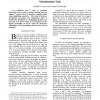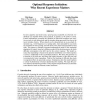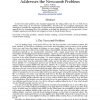97 search results - page 4 / 20 » Rationality and the speed of decision-making |
IJCNN
2008
IEEE
14 years 4 days ago
2008
IEEE
─Humans have a drive to maximize knowledge of the world, yet decision making data also suggest a contrary drive to minimize cognitive effort using simplifying heuristics. The tra...
HICSS
1999
IEEE
13 years 10 months ago
1999
IEEE
This paper presents a case study on the use of an alternative method of computer support to that normally used, one that uses voting as a tool for social rather than rational choi...
CI
2006
13 years 5 months ago
2006
This paper investigates decision-theoretic planning in sophisticated autonomous agents operating in environments of real-world complexity. An example might be a planetary rover ex...
NIPS
2008
13 years 7 months ago
2008
In most cognitive and motor tasks, speed-accuracy tradeoffs are observed: Individuals can respond slowly and accurately, or quickly yet be prone to errors. Control mechanisms gove...
SYNTHESE
2010
13 years 4 months ago
2010
In the Newcomb problem, the standard arguments for taking either one box or both boxes adduce what seem to be relevant considerations, but they are not complete arguments, and att...



